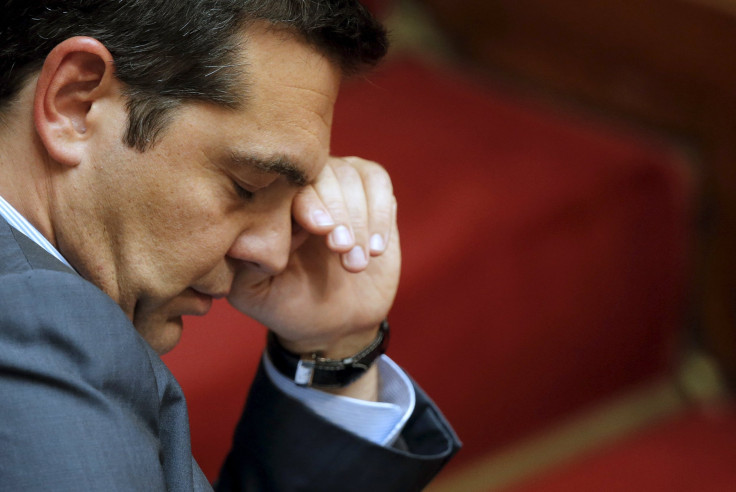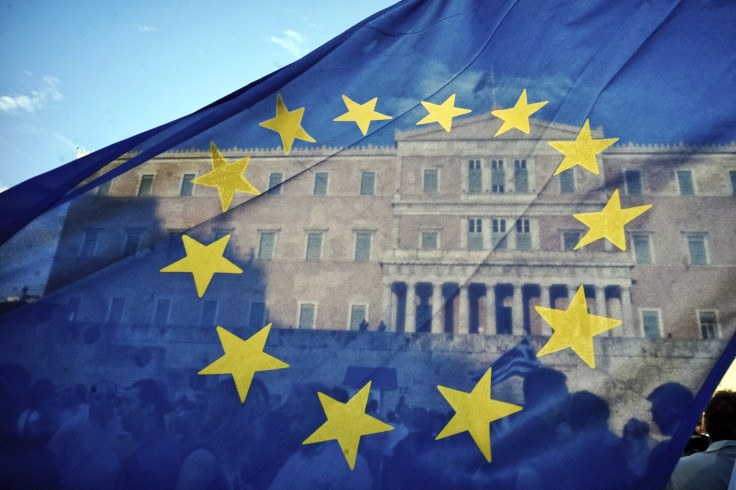An Austerity Bailout And The Greek PM's Resignation: What Next For Alexis Tsipras And His Anti-Austerity Party Syriza?

ATHENS, Greece -- Within hours of a new bailout deal for Greece being approved by European parliaments, Alexis Tsipras, the Greek prime minister and left-wing firebrand, resigned from his position after only eight months in power. His resignation triggers snap elections that will take place in about a month, most likely Sept. 20. These will be the fifth elections Greece has held since the onset of the financial crisis six years ago.
Tsipras' resignation and the coming elections have been met with equanimity by markets and European politicians, who don’t foresee instability following his departure. Fears have largely been assuaged after the Europeans granted Greece $96 billion of financing over three years -- and with the first tranche already disbursed, there's enough to cover the country’s debt repayment obligations and support a banking system that’s still reeling from the shock of capital controls imposed in July.
Ordinary Greeks have mixed feelings about it. For some it was obvious that it was coming; for others, not so much. Student Nick Tsirabidis, 20, told International Business Times, “I was quite surprised, especially as in the last few weeks, everything happened backstage. No one knows what is really happening, much like during the negotiations.”
While Syriza's core voters find the Greek bailout deal repugnant, viewing it as a violation of the party’s anti-austerity mandate, it is a calculated risk for Tsipras, whose growing troubles within his own party have left him unable to govern the country.
He had to rely on votes from the opposition parties New Democracy, To Potami and Pasok to get the deal through the Greek parliament, as more than 40 of Syriza’s MPs declined to toe the line, leaving him with fewer than 120 MPs. New Democracy’s leader Vangelis Meimarakis made a statement immediately afterward that his party wouldn't support Syriza on future occasions, in an attempt to hold Tsipras to ransom. It was at this point that the 43-year-old Tsipras was left with no other option but to offer his resignation.

The question now is what happens to the party and to the Greek political landscape in general. Tsipras is secure in the knowledge that the opposition is in tatters, with little to offer in the way of ideas or inspiration. Polls show that Syriza is still ahead of New Democracy by as many as 20 points, and Tsipras’ personal approval ratings are unparalleled.
“There is no one else at the moment,” Tsirabidis says, echoing the prevalent feeling across Greece. Tsipras has positioned himself as the natural leader of the country, and his challengers are not currently capable of competing against him.
But a number of new challenges face Syriza and its leader, for which there are no easy solutions. In January, the party campaigned on an anti-austerity platform promising to free Greece from the heavy-handed deals between the country and its European creditors. Now, eight months down the line, they've not only failed to do that, but they've signed up to a deal that carries much harsher terms than the one preceding it.
Cuts in pensions, extensive privatization and further tax hikes are only some of the things Syriza had to sign onto in order to keep the country solvent and in the eurozone. Tsipras’ hand was forced after the country’s lenders refused to budge during the six-month negotiations that followed January elections.

Having signed this austerity deal, what platform will Syriza campaign on next? Already, the rebels inside the party, headed by ex-Energy Minister Panagiotis Lafazanis, have split from Syriza and formed their own party under the name Popular Unity. With 25 MPs, it's now the third-largest formation in the Parliament behind Syriza and New Democracy. The party's stated aim is for Greece to leave the euro and head onto uncharted waters. A poll earlier in the summer, gave the then-hypothetical party, headed by Lafazanis, an 8 percent share of the vote.
While it is not an electoral threat to Syriza, Popular Unity does represent the radical left identity that Syriza once claimed for itself. Now Tsipras is seen by many as a sellout. “He didn’t even carry out the media reform and gay marriage legislation he had promised,” said Elena Xanthopoulidou, a 29-year-old trainee doctor who is not a supporter of the party but was hoping to see positive social reform.
A frequent debate over Greek dinner tables is whether Tsipras was right to agree to the deal, which he's promoted as much better than anything his predecessors got. The long-term effect on the party - and the Greek government - remains to be seen.
What is certain is that Syriza is no longer the radical left party that it set out to be -- Tsipras now firmly occupies the center ground. The deal he signed on does have positive aspects: $96 billion over three years is a much more honest amount of financing for an economy that is stagnating and unlikely to revive any time soon. He managed to negotiate the release of funds in much larger chunks, ending the Troika (European Central Bank, International Monetary Fund and Eurogroup) of lenders' slow torture of releasing limited funds that were only enough to cover short-term debt repayment installments. The deal also includes a view to alleviate some of the suffering that austerity has brought on the most vulnerable in Greece. But it’s still austerity.
“He betrayed people’s trust” Tsirabidis says. “I thought he was a good PM until the 5th of July [referendum day]. Since then, he’s been horrible.”
Tsipras is left with limited ammunition -- and needs to make every bullet count: his personal brand and the trust that the Greek people have placed in him, a deal that provides breathing space and the chance to reform Greek society in ways that don’t have an impact on the country’s budget. Will it be enough? In the short-term, the fragmentation of the Greek political landscape will continue. New players will enter the stage, with Popular Unity probably absorbing other far-left formations.
The interesting prospect is one that takes the long-term view. With elections coming up in Spain and Portugal, Tsipras, with a renewed mandate, might get the opportunity to reform the EU from a position of some security. Likewise, his dream to reform Greece might bear fruit sooner than expected. He could be the leader that Greece needs in order to get back on its feet. It could still end in tears, but Tsipras and Syriza might just cut it.
© Copyright IBTimes 2024. All rights reserved.





















